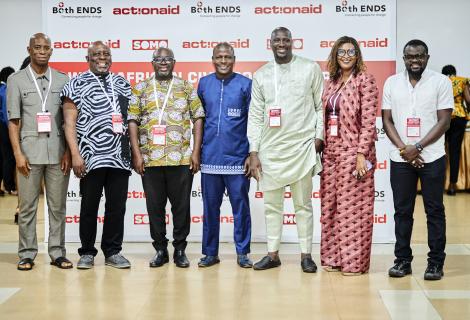West African Civil Society Calls for Investment Treaty Reforms to Promote Development and Climate Justice

West African civil society organisations have renewed calls for urgent reform of international investment treaties to promote sustainable development and climate justice across the continent.
This follows the successful conclusion of the West African Civil Society Investment Policy Forum, held in Accra, Ghana, from October 6–8, 2025, under the theme “Aligning Investment Policy Frameworks to Climate and Sustainable Development Goals.”
The forum, hosted by ActionAid Ghana in collaboration with the Centre for Research on Multinational Corporations (SOMO), Gower Initiative for Sustainable Development, and Both ENDS, brought together civil society representatives from 13 countries across Africa and beyond, including Ghana, Nigeria, Côte d’Ivoire, Senegal, The Gambia, Sierra Leone, Cameroon, Uganda, Kenya, South Africa, Burkina Faso, Argentina, and The Netherlands.
Over three days, participants examined 132 Bilateral Investment Treaties (BITs) in West Africa, highlighting how outdated agreements and Investor-State Dispute Settlement (ISDS) mechanisms continue to erode national sovereignty, drain public finances, and obstruct progress toward climate and development goals.
Speaking at the forum, experts and policy advocates underscored that many existing BITs are rooted in historical power imbalances, designed primarily to protect foreign investors at the expense of host countries’ policy space. They argued that such treaties often prevent African states from adopting progressive laws that advance public interest, human rights, and climate resilience.
Evidence presented showed no proven link between the existence of BITs and an increase in Foreign Direct Investment (FDI). Instead, participants observed that these treaties frequently expose African governments to expensive international arbitration claims, with compensation awards ranging between US$100 million and US$1 billion — resources that could otherwise support public services and infrastructure.
The forum also drew attention to persistent climate injustices, noting that Africa remains the lowest global emitter of greenhouse gases yet bears the greatest burden of climate change impacts. Participants called for an urgent shift toward investment frameworks that promote renewable energy, green industrialisation, and fair transitions for affected communities.
At the end of deliberations, the forum issued a call to action urging West African governments to:
- Terminate or renegotiate obsolete investment treaties that undermine national interests and sovereignty;
- Adopt the African Continental Free Trade Area (AfCFTA) Investment Protocol as a fairer, more transparent, and regionally aligned framework; and
- Prioritise industrialisation and value addition to ensure African countries benefit more equitably from their natural resources.
Participants further emphasised the need for regional cooperation among policymakers, civil society organisations, and intergovernmental bodies to reform the continent’s investment landscape and ensure that future agreements advance development, gender, and climate justice.
In his closing remarks, John Nkaw, Country Director of ActionAid Ghana, reiterated the organisation’s commitment to amplifying civil society voices in shaping fair and sustainable investment policies.
“Reforming outdated treaties is not just a legal necessity—it’s a moral imperative,” he stated. “For Africa to achieve inclusive and climate-resilient growth, our investment frameworks must put people and the planet before profit.”
The forum reaffirmed the collective resolve of West African civil society to push for transformative investment frameworks that advance social justice, environmental sustainability, and regional economic sovereignty.
-End-